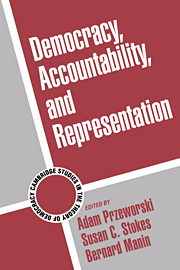Book contents
- Frontmatter
- Contents
- List of Contributors
- Introduction
- Part One Elections, Accountability, and Representation
- 1 Elections and Representation
- 2 Electoral Accountability and the Control of Politicians: Selecting Good Types versus Sanctioning Poor Performance
- 3 What Do Policy Switches Tell Us about Democracy?
- 4 Accountability and Authority: Toward a Theory of Political Accountability
- 5 Accountability and Manipulation
- 6 Party Government and Responsiveness
- 7 Democracy, Elections, and Accountability for Economic Outcomes
- Part Two The Structure of Government and Accountability
- Part Three Overview
- Author Index
- Subject Index
4 - Accountability and Authority: Toward a Theory of Political Accountability
Published online by Cambridge University Press: 05 June 2012
- Frontmatter
- Contents
- List of Contributors
- Introduction
- Part One Elections, Accountability, and Representation
- 1 Elections and Representation
- 2 Electoral Accountability and the Control of Politicians: Selecting Good Types versus Sanctioning Poor Performance
- 3 What Do Policy Switches Tell Us about Democracy?
- 4 Accountability and Authority: Toward a Theory of Political Accountability
- 5 Accountability and Manipulation
- 6 Party Government and Responsiveness
- 7 Democracy, Elections, and Accountability for Economic Outcomes
- Part Two The Structure of Government and Accountability
- Part Three Overview
- Author Index
- Subject Index
Summary
We take it for granted that modern government must be democratic in the sense of deriving its authority directly or indirectly from the people. But democratic governments differ greatly in producing policies that are responsive to the popular will. In part, this variation may be traced to the diverse representational structures of various democratic governments. Electoral institutions are employed not only to choose good public officials, but as mechanisms to hold incumbents accountable to the public, and, in these ways, they may make policies more or less responsive to public wishes. Accountability is, on this view, a property of institutional structures, whereas responsiveness is a consequence of interaction within such structures. Put another way, responsiveness is a measure of how much accountability an institutional structure permits.
Of course, responsiveness is not an unmitigated virtue. Most of us want government to be responsive when it comes to matters like building roads and universities, establishing a system of welfare and social security, and deciding how protective we will be of natural resources. What government should do in these cases is not a matter of justice or morality but depends on what cooperative projects citizens wish to undertake. But in the administration of programs in which the dispensing of justice is concerned, and perhaps in the case of managing monetary policy, popular responsiveness is not so attractive. We may want our judges to be accountable to someone in order to ensure that they are not venal or partisan but not because we wish their decisions to respond to popular preferences.
- Type
- Chapter
- Information
- Democracy, Accountability, and Representation , pp. 131 - 153Publisher: Cambridge University PressPrint publication year: 1999
- 111
- Cited by



